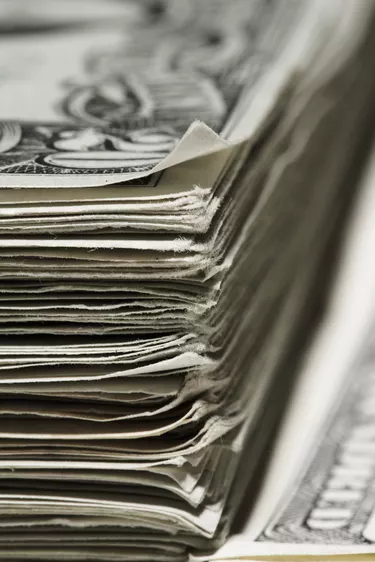
Because money laundering was such a problem, the Bank Secrecy Act of 1970 was passed, which included numerous provisions to help aid the federal government in identifying potential launders. Laundering typically involved cash, so the requirements of the act focused on cash transactions. Since 1970, Congress has expanded the provisions of the BSA numerous times, including in the USA Patriot Act. As of 2021, there are a number of different cash transactions that must be reported to the Internal Revenue Service.
Bank Deposits Reported to IRS
Video of the Day
According to the IRS, banks, credit unions, thrifts, insurance companies, stockbrokers, casinos, or any business that sells a "stored value" instrument like a money order or a cashier check must record and report any cash transactions of more than $10,000 either in a single transaction or series of transactions within 24 hours of each other. These organizations also are required to report any activity deemed suspicious.
Video of the Day
Consider also: How to Deposit Money Into Your Bank Account
Currency Transaction Reports
According to the BSA, any cash transaction $10,000 or more must be reported to IRS regardless of the circumstance. These reports are called Currency Transaction Reports. Additionally, multiple transactions made within 24 hours involving cash must be treated as a single transaction if the transactions are made by or on behalf of the same entity and the total amount of cash exchanged is more than $10,000.
In addition to reporting these transactions to the IRS, if the transaction involves an instrument such as a money order, a cashier's check or a travelers check, the institution must also record the transaction in its Monetary Instrument Log. This form must be kept onsite at the financial institution and produced at the request of an examiner or auditor at any time to verify compliance. The MIL must kept for five years.
Suspicious Activity Reports
Part of any financial institution's employee training includes identifying signs of money laundering. In-person transactions of $2,000 that show signs related to money laundering or any other violation of the Bank Secrecy Act must be reported. These reports are called Suspicious Activity Reports. Banks must also file a SAR if they deem a transaction of any size to be suspicious.
Multiple, related transactions of $5,000 or more also must be reported. Institutions also cannot inform a customer that an SAR has been filed as a result of his transaction. According to the U.S. Treasury Financial Crimes Enforcement Network, Suspicious Activity Reports have been changed to FinCEN reports, which are reported electronically using the BSA-E Filing System.
Exempt From Cash Deposit Reporting
Because some individuals or businesses make numerous cash transactions of over $10,000 regularly, banks do have an option to exclude these clients from CTR reporting. Banks may file a "Designation of Exempt Person" form with the IRS to designate a customer as exempt for the purpose of CTR reporting under the BSA. This designation lasts for two years, so banks must refile the form biennially to renew their clients' exemptions.
Identification for Suspicious Bank Deposits
In addition to reporting the transactions, the financial institution also must provide proof of the depositor's identity when filing a Currency Transaction Report to the IRS. This means that when making any large cash deposit, the depositor must provide extra identity documentation, such as a passport, a driver's license, a military ID or other government-issued ID.
Additionally, according to the IRS, an established relationship with the bank or a bank officer who recognizes the customer does not constitute evidence to positively identify the depositor.
Consider Also: What Is the IRS Identity Protection Pin?